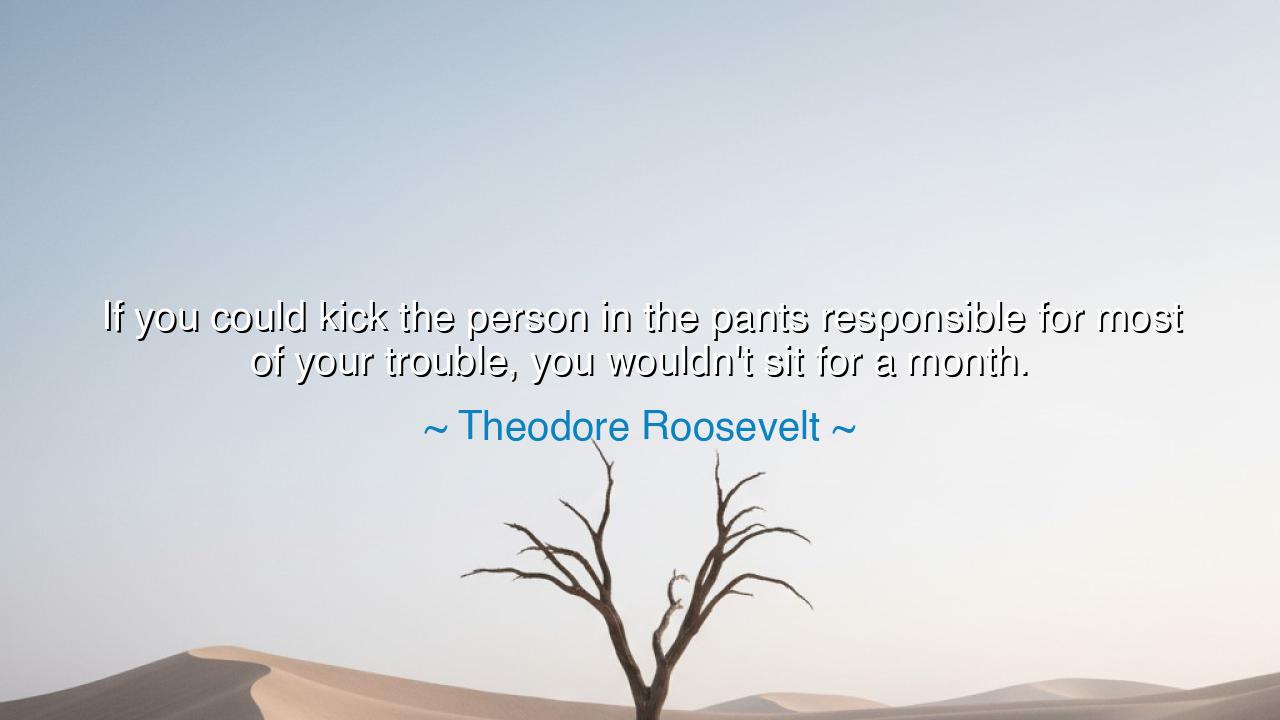
If you could kick the person in the pants responsible for most of
If you could kick the person in the pants responsible for most of your trouble, you wouldn't sit for a month.






In the great tapestry of life, there are moments when we look to the source of our suffering and misfortune. We search for the one to blame, the one whose actions have led us into the depths of trouble. And yet, as Theodore Roosevelt wisely declares, "If you could kick the person in the pants responsible for most of your trouble, you wouldn't sit for a month." This striking, bold declaration holds a mirror to our own role in the hardships we face, revealing that often, the source of our suffering is not some external force, but ourselves.
The essence of Roosevelt’s words lies in a profound truth: we are the architects of our own destiny. When we face adversity, we often point to others—our fate, our circumstances, or the actions of others—as the cause of our pain. Yet, in doing so, we overlook the fact that we, in some way, have played a part in the creation of our troubles. The truth is not always comfortable, and it may be far easier to cast blame than to confront the choices and decisions that have shaped our lives. Roosevelt’s sharp wit cuts through this illusion, urging us to look within, for it is often our own inaction, pride, or hubris that has brought us to our current state.
Consider the great tale of Odysseus, the hero of Homer’s epic journey, who faced endless trials and tribulations. While many of the challenges he faced were caused by gods and fate, much of his suffering could be traced back to his own decisions—his pride, his desire to prove himself, and his failure to heed the wisdom of others. Had Odysseus taken a different path, listened more carefully to the counsel of his companions, or been less consumed by his own desires, his journey would have been far less perilous. Just as Odysseus bore the consequences of his actions, so too do we bear the weight of our own choices, for we are often the ones responsible for the storms we weather.
The wise Marcus Aurelius, the stoic philosopher and Roman emperor, understood this well. In his meditations, he urged himself—and others—to reflect on their own conduct. He wrote that we must control our own thoughts and actions, for in doing so, we shape our reality. The Stoics believed that external forces were often beyond our control, but that our reactions, our thoughts, and our decisions were entirely within our grasp. If we are to grow, to evolve, we must begin by taking responsibility for the choices that have led us to where we stand.
The lesson in Roosevelt’s quote is not one of mere self-flagellation, but rather a call to action. It is a reminder that we hold the power to shape our futures. We are not helpless victims, tossed around by the winds of fate, but agents of our own destiny. If we wish to overcome our troubles, we must start by recognizing the role we’ve played in bringing them about. This recognition is the first step toward transformation. The journey of self-improvement begins not in blaming the world, but in holding ourselves accountable for our part in the story of our lives.
It is also a call to growth. We cannot grow if we are constantly pointing fingers, for growth requires honesty and the willingness to face uncomfortable truths. Self-awareness is the key. As Leonardo da Vinci once said, "Knowing yourself is the beginning of all wisdom." It is only by understanding our flaws, our shortcomings, and the choices we’ve made that we can begin to build a better future. In the act of self-reflection, we free ourselves from the chains of victimhood and place ourselves on the path to empowerment.
The practical lesson here is one of ownership. If you wish to change the course of your life, take responsibility for the role you have played in creating your current situation. Reflect upon your choices—both the ones made with intention and those made out of neglect or fear. Take charge of your actions, and be mindful of the decisions you make moving forward. Do not look to others for the cause of your suffering, but instead ask yourself, "What have I done to contribute to this?" In that honest inquiry, you will find the strength to rise above your circumstances and create a future of your own design.
Thus, Roosevelt’s words are not just a wry observation; they are a call to action, a plea to stop being passive in our own lives. Take responsibility for your actions. Recognize your power in shaping the course of your journey. And in that realization, you will find not just the courage to face your troubles, but the wisdom to overcome them and emerge stronger on the other side.






AAdministratorAdministrator
Welcome, honored guests. Please leave a comment, we will respond soon